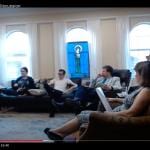 As we saw the pandemic coming in December, we wanted to do something. There was nothing much to do as a family, though we started talking and preparing at The College and School for bad outcomes best we could. Like everyone in an emergency, we wanted to protect the family, especially the “cheeps” as Hope calls the kids.
As we saw the pandemic coming in December, we wanted to do something. There was nothing much to do as a family, though we started talking and preparing at The College and School for bad outcomes best we could. Like everyone in an emergency, we wanted to protect the family, especially the “cheeps” as Hope calls the kids.
What about food?
We have an urban garden (with chickens!) at the School and we know that a great deal of produce can be grown on very little land. We have, at our home, very little land having moved across from the campus. . . urban by choice. As a result of all of this, Hope planted a cabbage and it grew. We have harvested this massive cabbage, the edible parts are smaller than you might think, and now are ready to write a georgic poem.
After we make the soup, which requires many other ingredients we bought at a grocery store, the cabbage will be gone. We did something that was exciting to us, but not really consequential. We would have to do much more to do something that would help with our food supply.
Our excitement, relative to the return, reminded me of Pip in Great Expectations who outspent his generous allowance and contracted horrible debts. When the pressure got too great, Pip and his friend would sit down and create a budget. Having created an austerity plan that would help them survive, the two friends would feel much better and go off to celebrate spending more money. The plan was even worse than our cabbage, because you can eat the cabbage, providing some sustenance, but the plan without implementation does nothing.
We often get on an exercise bike one day and in our virtue splurge on cheese cake. Many of us ended four weeks of isolation and felt “done” when we were about halfway to the goal. How can we make sure that we do not feel we have done something worthwhile when we have not?
- Define what is to be achieved (success) and make sure the goal is meaningful.
When we planted one cabbage, we had no chance of making any meaningful impact on our food supply. This is not a productive garden like that at the School and College. (I should note that we did know this. Despite this we still felt a sense of accomplishment. This is a reminder that a sense of accomplishment and accomplishment are not always causally connected!)
- Have a plan that has a chance of ending in success.
We do not have a large amount of space and limited time. Are there vegetables that we could grow that would add to our food supply or at least give us some tasty treats? An herb garden has provided us fresh flavors for our (grocery store) salads that add a great deal of taste! Over time our tiny yard has produced a significant amount of certain herbs. Our plan to grow some fresh herbs, unlike a plan to grow all our own food (!), has a chance of ending in success.
In this case, modesty is often valuable. The good done beats the glorious triumph only found in our unrealistic plans.
- Implement the plan.
A plan, as Pip shows, is no good if not implemented. Dreamers must be doers if the dream is to become true. Walt imagined a Disneyland, hired Imagineers, got the financing, and built the park. His ability to build a team with talents he did not have was a genius of its own.
Go plant the garden!
- Follow the plan to completion.
Those who endure to the end reap the herbs from the garden! Too many plans are started, think my workout routines in the past, and do not get finished and so not all the benefits happen! Often we are distracted from one good begun by another potential awesome project and so end up with a pile of unfinished projects.
The great leaders I have known, some have been bosses, were able to dream with some realism, make plans, bring together a top team, implement the plan, and follow that plan to completion. Happily, one even gets the thrill of a giant cabbage or two in a completed plan!











